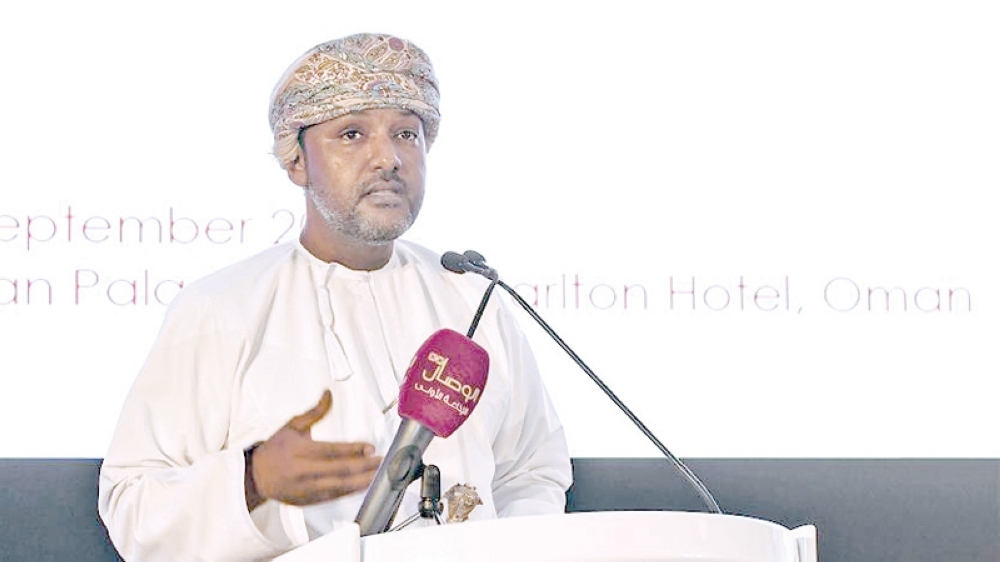

Cautionary advice: Our accomplishments should not push us into a zone of comfort, says CBO Executive President
The Central Bank of Oman (CBO) has urged banks and financial institutions in the Sultanate to be wary of technology risks as they press ahead with digitalisation — a powerful enabler that was successfully leveraged by the industry to keep operating despite the pandemic.
CBO Executive President Tahir Salim al Amri (pictured) hailed the industry’s resilience in the face of severe challenges posed by Covid-19 by switching to digital channels to offer a complete array of banking services to businesses and the general population. But he cautioned against complacency against potential perils lurking in new technologies that banks — both locally and globally — are rapidly embracing as part of their digital transformation strategies.
“We are passing through an era of unexpected challenges and heightened uncertainties — but one of the silver linings amid these testing times has been the agility of the banking and financial industry in adapting swiftly to the evolving situations to ensure the wheels of the economy are moving and customer expectations are (met)”, Al Amri stated.
Speaking at the New Age Banking Summit held at Al Bustan Palace — A Ritz Carlton Hotel recently, the Executive President expressed his “congratulations” to the sector in almost seamlessly moving from the predominantly brick-and-mortar setup of the pre-pandemic era to online and digital services once the lockdowns and other social distancing protections came into force.
But he added: “A word of caution: Our accomplishments should not push us into a zone of comfort. We need to be vigilant, cognisant of the technology related risks in our digital journey, and accordingly keep revisiting the robustness of our technological infrastructure to sustain and build on the momentum that has been created.”
The warning comes as banks in Oman, and indeed around the world, become increasingly reliant on technology and IT infrastructure to run their critical operations. Inherent with this overly dependence on technology are risks that may manifest in the form of vulnerabilities to, among other perils, hacking, cyber attacks, data security, rapid obsolescence, inadequate supervision and regulation, use of crypto assets, and digital exclusion.
The pandemic, Al Amri pointed out, has redrawn the contours of Oman’s banking industry landscape, with remote working, online channels, contactless payments, and so on, transforming the sector.
“Social distancing protocols had led to the implementation of ‘work-from-home’ on a scale that we had never thought of before. We never had the luxury of lead time for planning, for the ‘work-from-home’ revolution with proof of concept and pilot runs. The banking industry had to go live straight away and we did it successfully. Congratulations!” he said.
The burgeoning pandemic, the Executive President noted, sparked a transformation in delivery channels as health and social distancing protocols restricted in-person visits to branches and ATMs.
“The banking and financial industry, with its wide array of digital options, ably supported the robust infrastructure of the Central Bank, was well positioned to handle the scale and meet customer expectations,” he said, applauding the “nimble-footed counter responses” by the sector to remain operational to a very large extent despite the constraints.
This agility demonstrated by banks and financial institutions came in the face of the unprecedented nature of the challenges posed by the pandemic. Thus, while banks are prepared for business disruptions from calamities, such as floods and earthquakes, few had anticipated newer types of disruptions of the kind unleashed by the pandemic, he noted.
But this transformation came at enormous challenges, the Executive President noted. “While ‘work from home’ had ensured continuity of businesses and processing of back office functions without interruptions, it threw up unfamiliar risks. For instance, apart from enhanced technology and related operational risks, it created difficulties in ensuring effective internal controls and sustaining employee motivation. I believe we have all successfully managed these challenges and are not deterred by them anymore even as we now transit back to a somewhat in-premises work (regimen).”
In concluding, Al Amri pledged to extend continued support to the industry, in conjunction with the government and other stakeholders, to ensure that banks “calibrate and continue its digital journey.”
Oman Observer is now on the WhatsApp channel. Click here




